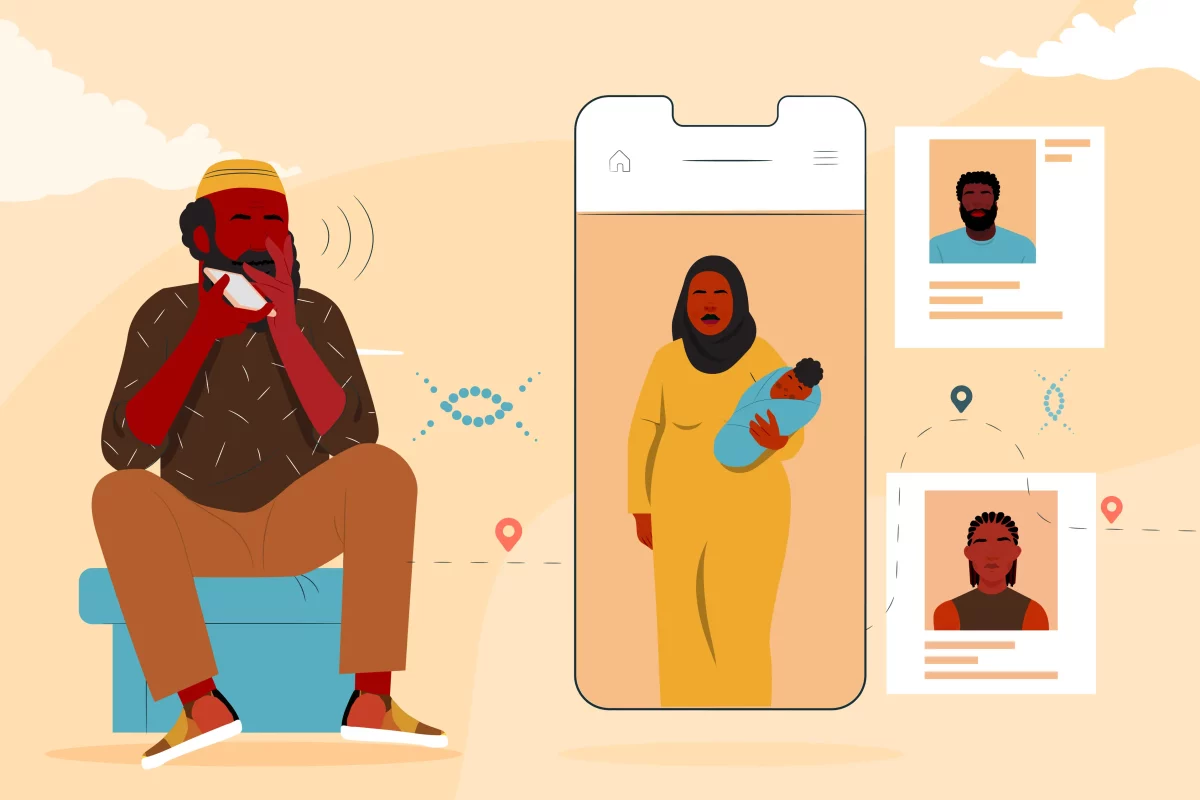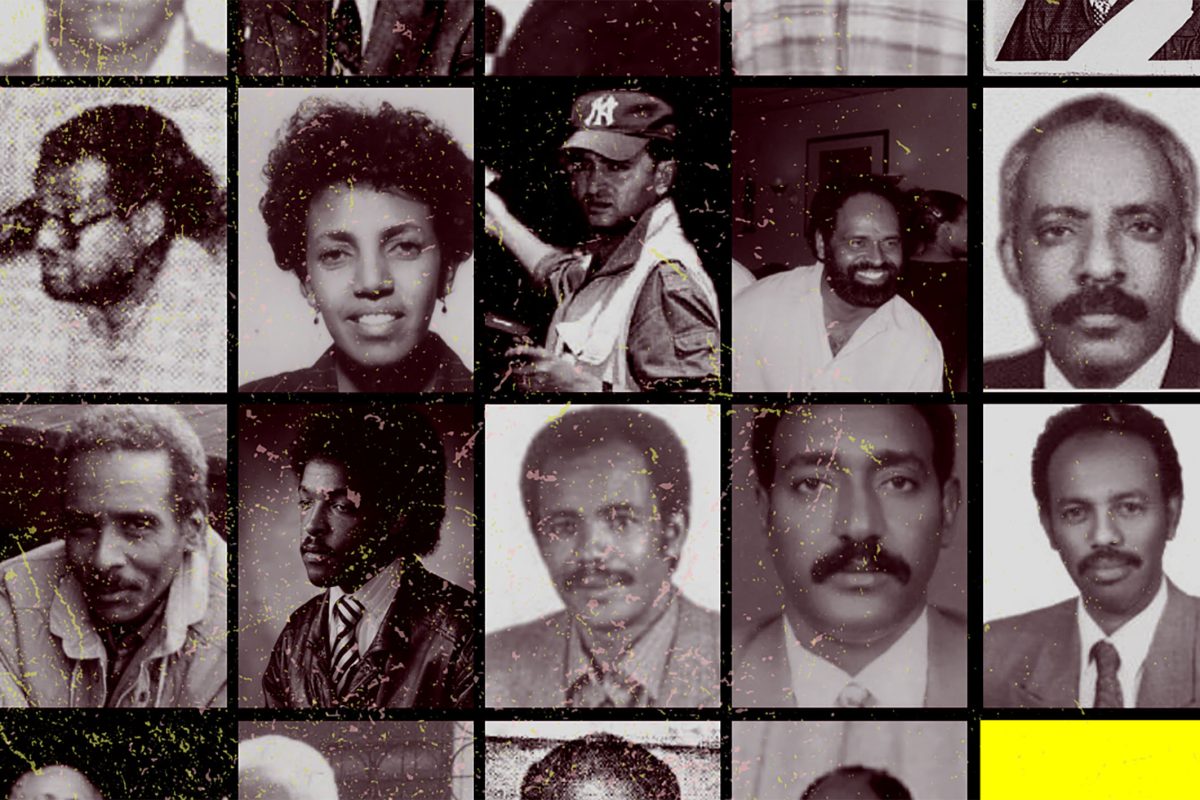There are thousands of Eritrean refugees caught in the crossfires of the ongoing conflict in Ethiopia’s Tigray region. According to witness accounts and U.N. officials, forces from all sides have attacked their refugee camps, kidnapped or murdered residents, and ransacked their food and possessions.
Fighting in the region broke out in November 2020 between the Tigray regional forces and the Ethiopian federal government. The conflict has left mass casualties in the thousands and has created a dire situation for the refugees populating the area.
Refugees have accused all sides of attacking them. Troops from Eritrea sent over the border to support the Ethiopian national army consider the refugees to be traitors for leaving their homeland. Refugees attacked by Tigrayan militias were treated as scapegoats because they share the same nationality as the occupying Eritrean troops. Ethiopia’s defense forces strategically bombed refugee camps and blocked exits, ways of passage for aid, and the relocation of the affected civilians and refugees.
“I am a double victim,” said a 27-year-old woman whom Tigrayan militia fighters raped along with her 17-year-old sister while they fled Hitsats. “Both in Eritrea, and now, here [in Ethiopia], I am not protected.”
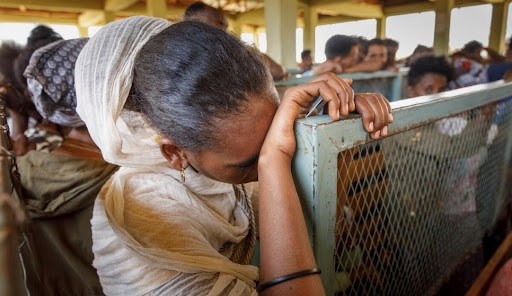
According to the United Nations, around 50,000 Eritrean refugees were present in four main camps in Tigray before the conflict and another 42,000 across the region and Ethiopia. Many refugees fled the authoritarian government in Eritrea and its policy of indefinite military conscription required of citizens. Human Rights Watch (HRW) published a report documenting the destruction of two camps early in the war that left many of their residents in an unknown limbo.
Eritrean and Tigrayan forces occupying the Hitsats and Shimelba refugee camps committed many waves of abuse between November 2020 and January 2021. “Eritrean refugees have been attacked both by the very forces they fled back home and Tigrayan fighters,” said Laetitia Bader, Horn of Africa director at Human Rights Watch. “The horrific killings, rapes, and looting against Eritrean refugees in Tigray are evident war crimes.” HRW’s report was based on witness interviews from 28 Eritrean refugees, aid workers and included evidence drawn from satellite imagery.
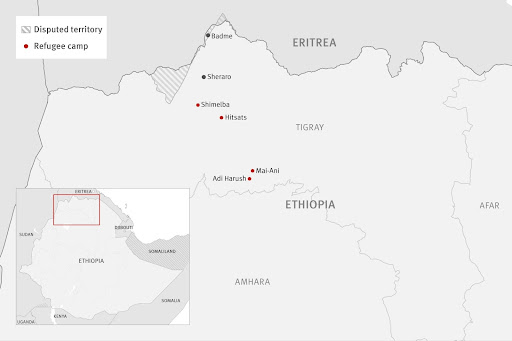
Eritrean forces initially arrived in Hitsats on November 19th, occupied the refugee camp, committed killings, and pillaged the center and surrounding town. Some refugees participated in looting, which inflamed tensions in the community.
On November 23rd, Tigrayan militia entered the Hitsats camp and attacked refugees near the camp’s Ethiopian Orthodox church, killing nine refugees and injuring 17.
One refugee told Human Rights Watch, “My husband had our 4-year-old on his back and our 6-year-old in his arms. As he came back to help me enter the church, they shot him.” Two dozen residents were killed during the clashes that day, HRW reported.
HRW could not determine if Tigray’s formal forces had direct command over local Tigray militias in operation around Hitsats.
HRW said shortly afterward, Eritrean troops detained 24 refugees, never to be seen again, and returned the 17 injured refugees to Eritrea. Eritrean troops withdrew from Hitsats camp in early December. Tigrayan forces returned on December 5th, shooting into the base and sending refugees to flee.
Based on witness accounts from refugees to HRW, the Tigrayan forces forced refugees back to Hitsats. Some women also reported Tigrayan fighters raped them as they tried to flee.
Tigrayan forces left Hitsats on January 4th, HRW said. The Eritrean forces returned, ordering the remaining refugees to leave. The Eritrean troops destroyed the camp between January 5th and 8th, leaving functional areas in ruins.
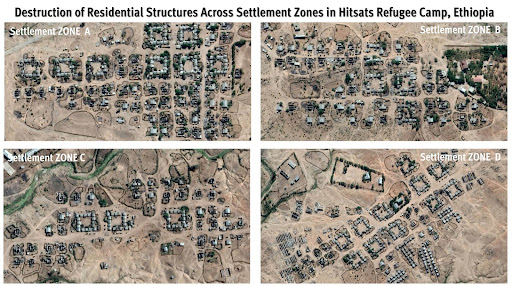
In Shimelba, HRW reports Eritrean forces killed one refugee, raped four refugees, and killed residents in the local area. Amid the violence and severe food shortages exacted by Eritrean and Ethiopian defense forces, some refugees returned to Eritrea. Other refugees fled south to the other two camps in Tigray, Adi Harush and Mai Aini.
However, refugees in these camps remained vulnerable as the Tigrayan troops continued to expand their offensive lootings and killings since June 2021. UNHCR reported that 7,634 out of the 20,000 refugees accounted for in Hitsats and Shimelba camps in October 2020 are unaccounted for as of late August 2021.
“For years, Tigray was a haven for Eritrean refugees fleeing abuse, but many now feel they are no longer safe,” Bader said. “After months of fear, abuse, and neglect, Ethiopia, with support from its international partners, should ensure that all Eritrean refugees have immediate access to protection and assistance.” – HRW.
Amid reports of the gross human rights violations occurring in the region, the United States’ President Joe Biden recently signed an executive order giving the Treasury and State departments the power to sanction Ethiopian and Eritrean government officials participating in military actions in Ethiopia. The hope was for the threat of sanctions to pressure warring parties to move toward a cease-fire.
“This action provides the Department of Treasury working in coordination with the Department of State the necessary authority to impose sanctions against those in the Ethiopian government, the Eritrean government, the Tigray People’s Liberation Front, and the Amhara regional government if they continue to pursue military conflict over meaningful negotiations to the detriment of the Ethiopian people.” — A senior administrator told reporters on a call previewing the announcement.
Previously, as reported by The Hill, the Biden administration in May announced visa restrictions on current and former Ethiopian and Eritrean officials as Amhara forces and members of the Tigray People’s Liberation Front. The U.S. has also restricted economic and security aid to Ethiopia. In August, the U.S. sanctioned General Filipos Woldeyohannes, the chief of staff of Eritrean Defense Forces, over human rights abuses committed by his troops in Tigray. General Filipos was designated under the Global Magnitsky Human Rights Accountability Act.
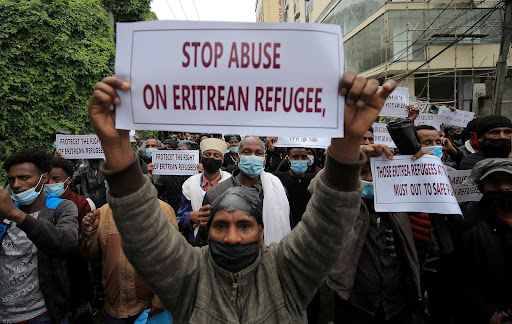
International human rights and humanitarian law protect refugees. Human Rights Watch outlines the Ethiopian government’s responsibility to safeguard Eritrean refugees while hosted within their borders. “The laws of war prohibit attacks against civilians, including refugees, and civilian property, and required parties to the conflict to facilitate humanitarian access to civilians in need.” Humanitarian organizations such as UNHCR must act swiftly to relocate refugees in Tigray.
However, this has been quite challenging. On November 3, 2021, PM Abiy Ahmed declared a state of emergency. Since then, Ethiopian authorities have arrested and detained some 70 aid-delivering truck drivers, primarily Tigrayan, contracted to the United Nations and forcefully removed UN personnel from the country. Many innocent Eritreans are also likely victims of these arrests and disappearances.
Ethiopian Prime Minister Abiy Ahmed pledged to bury his government's enemies ‘with our blood’ as he marked the start of the war in the Tigray region one year ago and declared a state of emergency https://t.co/4UQXAuV4To pic.twitter.com/d9jYXv9jGH
— Reuters (@Reuters) November 3, 2021
Last week, the first U.N.-led investigation attributed many of the worst atrocities and war crimes to Eritrean troops. The report, co-written with Ethiopia’s state-appointed human rights commission, said, “Eritrean soldiers committed dozens of rapes and mutilations, and kidnapped thousands of Eritrean refugees from Ethiopia and took them back to Eritrea, which they had fled to escape the country’s draconian military service and widespread political persecution.” The US would follow by sanctioning Eritrea’s ruling party, the PFDJ, military, and officials.
The United States is designating six Eritrean entities and individuals in connection with the ongoing violence in Ethiopia. The Eritrean presence in Ethiopia has exacerbated the conflict and hindered humanitarian access. Eritrea must withdraw troops immediately.
— Secretary Antony Blinken (@SecBlinken) November 12, 2021
Although the report indicates that Eritrean soldiers committed war crimes and potentially crimes against humanity, Eritrea is not a party to the International Criminal Court, so they cannot be held accountable in those courts.
Earlier this month, the White House announced that it would suspend trade benefits for Ethiopia over human rights violations. The question remains, why haven’t there been more swift acts to sanction Ethiopia as well. Is the US showing its favor to Ethiopia in hopes of maintaining their trade agreement?
Regardless, more needs to be done to protect the Eritrean refugees and all refugees and innocent civilians trapped in the warzone. And this zero-sum war must come to an end immediately.

